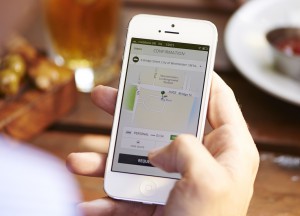
While car-sharing services like Uber may be gaining popularity, the vast majority of Americans want to keep driving their own cars.
Wall Street is watching closely as car-sharing service Uber prepares for its upcoming IPO. The San Francisco-based firm aims to take advantage of growing interest in transportation alternatives, conventional wisdom suggesting millions of Americans would be happy to walk away from their cars.
Or would they? A new study by auto supplier Continental finds that, contrary to popular belief, the vast majority of Americans have no intention of handing over their keys. And the study of 2,300 U.S. adults found that true no matter what their age or where they live.
“There is still a lot of excitement when it comes to driving a car,” said Continental Executive Board Member Helmut Matschi, who noted that the results were echoed in a similar study undertaken in Germany.
The U.S. survey found 94% of the respondents owned their owned vehicles. Only 1% had switched to car-sharing services as an alternative.
Matschi admitted he was surprised by the results – which will officially be revealed during the annual Society of Automotive Engineers convention in Detroit this week. He also cautioned that, “It may take more time…for innovations like car-sharing to kick in.”
(Regulators, lawmakers will be key to the success of autonomous driving. Click Here for the story.)
The auto industry is clearly in the midst of some major innovation. Continental is one of a growing number of automakers and auto suppliers developing autonomous vehicle technology which Matschi said is likely to come to market “quicker than many people realize.” And once it does become commonplace “it might trigger more interest in other forms of mobility,” including car-sharing.
One of the big surprises in the new study is that “Generation Smartphone” remains excited about driving, added Elmar Degenhart, the chairman of the Continental Executive Board. Among those survey respondents aged 16 to 25, 84% said they believe driving is important, and 76% said they drive just about every day.
“Contrary to the theories we hear time and again, the younger generation still wants to own cars,” said Degenhart. “But cars need to become more intelligent, as well as send, receive and process information more quickly in digital formats.”
(Autonomous vehicles are coming, like it or not, proclaims Google’s tech chief. Click Here for more.)
What Continental prefers to call “automated driving,” underscores the growth of onboard electronics. Today’s vehicles routinely use more microprocessors than the average American will have in their home or office.
One major area of growth is in infotainment. Chevrolet, for example, plans to offer 4G LTE connectivity on virtually all of its new vehicles, along with onboard WiFi hotspots. This will allow drivers and passengers to access a wealth of entertainment services, such as Pandora and Spotify.
The new Continental survey found 65% of the respondents – and 73% of those aged 16 to 25 – want a car equipped with Internet connectivity.
But tomorrow’s connected cars also will be able to talk to one another, and to the roadway infrastructure. That, suggested Seval Oz, CEO of Continental’s Intelligent Transportation Systems group, should result in safer, cleaner and more efficient vehicles. One of the industry’s goals is to reduce the number of crashes, injuries and fatalities as close as possible to zero, she said.
(Drone delivery? Car shoppers look to the future. Click Here for more.)

The whole point of owning a car is individual freedom to come and go as you please, not on someone else’s schedule. Car sharing may suit some folks but it won’t change current auto ownership patterns.